
Education plus is an educational charity dedicated to improve schooling and educational opportunities for children, youth and young adults living in Internally Displaced Person (IDP) communities in Abuja, Nigeria. We empower youth affected by displacement through quality education, psychosocial support, and skills development. We believe education is a fundamental human right that every child deserves, regardless of their circumstances.
Conflict and Displacement
Over the past two decades, 2.7 million people (including 1.4 million children) have fled their homes due to Boko Haram violence in Nigeria. Founded in 2002, Boko Haram promotes an extremist version of Islam that forbids participation in Western-associated activities, including secular education.
The group has carried out devastating attacks across northern and central Nigeria, targeting churches, public spaces, government facilities, and entire communities. At its peak in the mid-2010s, Boko Haram was considered the world's deadliest terrorist organization. With thousands of fighters and substantial weaponry, their insurgency continues to displace families and traumatize communities.

• Only 16.8% of Nigerian youth have attained post-secondary education (National Youth Survey)
• 62.9% of Nigerians live in multidimensional poverty, impacting their ability to afford or access quality schooling (World Bank)
• Only 5% of African youth access tertiary education compared to a global average of 25% (Global Partnership for Education)
• In Sub-Saharan Africa, only 6% of children enroll in tertiary education, versus 80% in OECD countries (Brookings Institution)
• African universities can admit only 33% of students who sit for entry exams (World Bank & AskWonder)
1. Research by Pitan and Adedeji (2012) highlights a critical mismatch between education and market needs:
“Many Nigerian graduates lack employable skills in IT, communication, and leadership.”
2. Over 33.3% of Nigerian youth are unemployed
3. For young women, the situation is more severe:
o Unemployment rate: 35.2%
o Underemployment: 25%
(National Bureau of Statistics)
Vision & Mission
• Provide educational opportunities for out-of-school youth
• Improve secondary education quality in IDP settlements
• Ensure IDP youths achieve their full life potential
• Education is a human right every child deserves
• Contribute to a society where every child has access to quality education
• Prepare children for future success regardless of background
• Integrity
• Empathy
• Empowerment
• Compassion

• Nigeria is projected to become the world’s third most populous country by 2050
(UN Department of Economic and Social Affairs)
• Youth unemployment/underemployment stands at 52.65%
(Vanguard, 2017)
• 24.4 million Nigerians are homeless—including school-aged youth
Amid rising inflation and shrinking disposable incomes, education becomes a luxury many families cannot afford. For most low-income households, survival needs outweigh schooling expenses, leading to:
• Early dropouts
• Reduced literacy rates
• Intergenerational cycles of poverty
At Education Plus, we believe that education is a human right, not a privilege. Every child—regardless of displacement or socioeconomic status—deserves the opportunity to learn, grow, and lead a dignified life.
We exist to bridge the gap between opportunity and need, working to equip displaced youth with the knowledge, skills, and support required to break the cycle of trauma and poverty.

The History
IDP Camps In Abuja







